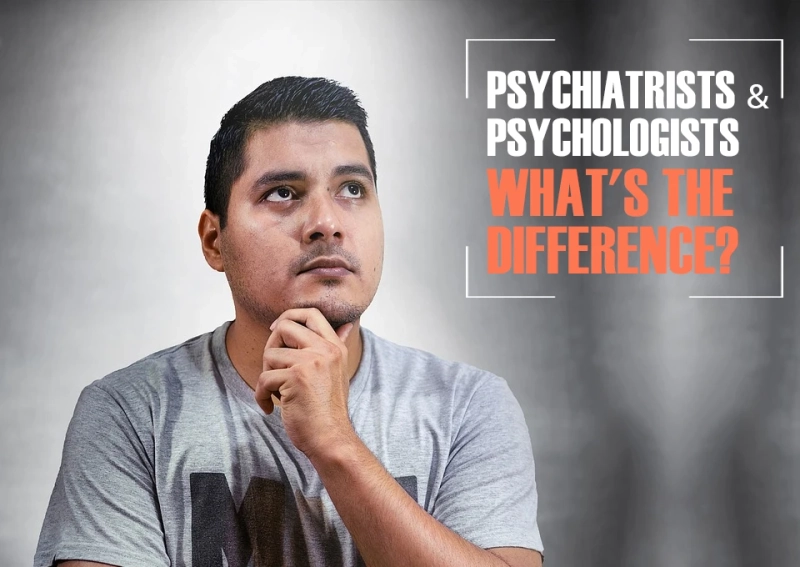Visiting a medical professional about your mental health is not a simple step to take. It might have taken you months or years to reach this decision.
Which's just the primary step. The next question is: "What sort of medical professional should I see?"
You could see your primary care physician. Lots of people do. Of the 8 million appointments for depression, about half of them are made with primary care doctors, according to a newspaper article on PBS.com.
If the primary care doctor's path is not for you, you are then faced with another choice: should you see a psychologist or a psychiatrist? How do you understand who is right for you?
What's the Difference Between a Psychiatrist & a Psychologist?
Prior to we check out the distinction, you must first understand that many psychiatrists and psychologists work carefully together. The main distinction between the 2 kinds of physicians boils down to medication: a psychiatrist can recommend it, while a psychologist cannot. In addition to offering treatment through medication, psychiatrists will typically perform talk treatment, cognitive behavior modification or other kinds of treatment. They may also make referrals to therapists or therapists (like psychologists). According to Psychology Today: "Psychiatrists receive the very same medical school education as any other medical physician, such as an internal medicine doctor or a pediatrician and, for that reason, hold a physician of medicine degree (M.D.)."
When to Choose a Psychologist.
A psychologist does not hold an M.D. degree. Psychologists will evaluate clients and treat them through therapy or talk treatment. Talk therapy is a technique of treatment that assists clients to re-evaluate their sensations and mindsets, developing healthier habits according to the American Psychological Association. The Association states that psychologists are "highly-trained specialists with proficiency in the areas of human behavior, mental health evaluation, medical diagnosis and treatment, and habits modification.".Using clinically verified procedures, a psychologist will work with a client to help them determine and separate a problem, recommend potential behavioral changes, and figure out the best strategy. Marian Margulies, Ph.D., a psychologist in New york city City and a candidate in psychoanalysis at the Institute for Psychoanalytic Education at the NYU Medical Center, said talk treatment is important because you aren't simply dealing with the signs-- you are discovering what's triggering the pain." If you're not getting to the reason for the pain, you're basically chained to the past," Dr. Margulies told, "Psychotherapy gets to the root."
When to Choose a Psychiatrist.
Even if psychotherapy is getting to the root of the issue, you still might require additional aid. With a medical background, a psychiatrist can review your total medical history. Comprehending the complete image is essential because some mood disorders might be brought on by physical conditions like hormonal changes (pregnancy or thyroid condition), according to the Mayo Clinic." Due to the fact that we found out how the body interacts with the mind; we can dismiss physical disorders as a reason for a mental disorder. This is essential since an individual might have a hyperactive thyroid, for example, which can trigger an anxiety attack, anxiety, sleeping disorders, or anorexia. We can look at thyroid blood tests or have a client consult an endocrinologist if we presume the problem comes from thyroid illness," Carol W. Berman, M.D., a scientific assistant professor of psychiatry at NYU Medical Centre in New York City City, composed in the Huffington Post. If depressive signs are significantly impacting your body and life, a psychiatrist can help identify if medication will assist. Notably, a psychiatrist can think about drug-drug interactions if you are already taking medication for other conditions. If a client requires it, a psychiatrist has the authority to recommend hospitalization. However, Dr. Berman composes that hospitalization is frequently the last resort:" The most typical types of psychiatric hospitalizations are for suicide attempts, detoxing from drugs or alcohol, psychotic episodes caused by mania or from schizophrenia. Many psychiatrists utilize hospitalization moderately as the last option if no other treatment will work.".If you are thinking about medication as a type of treatment, a psychiatrist might buy a pharmacogenomics test, which can help them get a better understanding of what medication might be more likely to work for you based on your hereditary makeup. The GeneSight test is an example of a pharmacogenomics test that psychiatrists can utilize as an extra tool to guide medication selection-- and help you avoid a prolonged experimental process.


